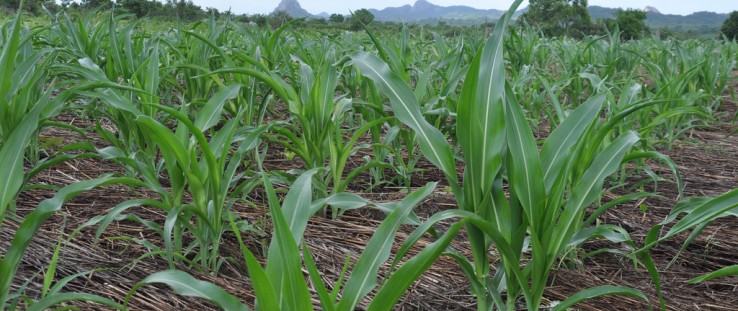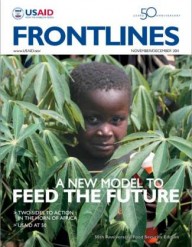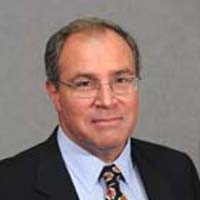 Crops in Mozambique
credit: USAID
Crops in Mozambique
credit: USAID
 Crops in Mozambique
credit: USAID
Crops in Mozambique
credit: USAID
On Sept. 21, PepsiCo Inc. announced a unique, trilateral partnership with USAID and the United Nations World Food Program during the Clinton Global Initiative’s 2011 annual meeting in New York. A key achievement of the U.S. Government’s Feed the Future initiative, this partnership will help build long-term economic stability for smallholder chickpea farmers in Ethiopia by involving them directly in PepsiCo’s product supply chain. And that’s just the beginning.
Question: Most people don’t think of chickpeas or Ethiopia when they think of PepsiCo. How did PepsiCo get involved in this project?
Derek Yach: At PepsiCo we are constantly seeking ways to create new markets, invest in emerging economies, advance healthy nutrition, ensure environmental sustainability, and drive the long-term growth and profitability of our company. PepsiCo’s work in Ethiopia was triggered by a discussion between PepsiCo, the World Food Program (WFP), and USAID which led to the signing of a Memorandum of Understanding on Jan. 28 at the World Economic Forum at Davos. The idea behind Enterprise EthioPEA was initiated at the request of Ethiopian Prime Minister Meles Zenawi, who wanted to use local crops to solve nutritional problems and build his country’s export market. Knowing the nutritional benefits of chickpeas and considering our long term business, we worked closely with the prime minister, as well as other partners like the Ethiopian Institute for Agricultural Research, to make the vision a reality.
Given their health benefits, chickpeas are an important, innovative ingredient for new ready-to-use supplementary foods (RUSF)—often called food aid. At a time where 13 million people are suffering from famine and malnutrition in the Horn of Africa, there is both an acute and a long-term need to address famine and chronic malnutrition in the region. With our chickpea project, not only will we be helping to alleviate famine and malnutrition, but we will also ensure that local farmers will get more work and guaranteed income while enabling our long-term growth, innovation, and relevance among customers.
Consumers worldwide are demanding that healthier food options be made more available and affordable. PepsiCo is looking at every point of the supply chain to meet our consumers’ demands, with the aim of developing sustainable agriculture that benefits communities, farmers, consumers and business. Enterprise EthioPEA will work with smallholder chickpea farmers to increase the productivity and value of their crop and grow the domestic market and export markets for chickpeas. With the expected growth of our business in chickpea-based products such as hummus, we expect to source at least 10 percent of our supply from Ethiopia, which amounts to at least 2,000 tons of chickpea per year.
Q: As a private entity, what does PepsiCo hope to accomplish through this work? And why is it important now?
Yach: With Enterprise EthioPEA, PepsiCo hopes to use chickpeas to address famine and malnourishment in the Horn of Africa, stimulate economic development in Ethiopia, and support PepsiCo’s business strategy for Africa more generally. Today, PepsiCo is one of the world’s largest manufacturers of chickpea-based hummus, a product that is experiencing rapid growth in demand. Chickpeas will play an important role in growing PepsiCo’s nutrition business to $30 billion in revenue by 2020. This is truly a great example of what we at PepsiCo call “Performance with Purpose.” The project will create new markets for products and increase yields for farmers while allowing PepsiCo to create healthier, locally sourced foods and beverages that benefit the whole community while driving long-term growth for the company.
Q: What is unique or different about this partnership?
Yach: Enterprise EthioPEA works on three levels. It benefits the long-term health and nutrition of the people of Ethiopia—and potentially beyond. It potentially benefits the economic livelihoods of millions of smallholder Ethiopian farmers and their families. And it benefits PepsiCo by providing us new insights into a growing market and helping us grow our nutrition business. Of course, it also brings together private enterprise, governmental agencies, NGOs, and the local community for a new and impactful way of helping others. With so many stakeholders involved, we’re blending collaboration, know-how, expertise, and resources to benefit local communities and global consumers.
Q: Has PepsiCo ever partnered with USAID or the World Food Program in the past?
Yach: USAID and WFP are key partners of PepsiCo and we’ve worked together in the past on various initiatives and issues. For example, in 2009, the PepsiCo Foundation committed $2.2 million for a program that brings together PepsiCo’s global logistics experts to help strengthen WFP’s response to growing hunger needs, as well as to improve its operating efficiency and response time in crisis situations. PepsiCo has also worked with USAID to reach approximately 80,000 small farmers in India to provide quality seeds, fertilizer, and advisory services in order to optimize the quality of potato production.
Q: What have been some of the challenges of working with USAID and other non-traditional partners?
Yach: I started working with USAID 20 years ago in South Africa and have seen [the Agency] in action at many levels. It has the challenge of being a large development agency with tough competing priorities in a world filled with seemingly endless demands. Its strengths have always been related to the quality and dedication of its teams in countries and in D.C.; USAID’s clear commitment to promoting development using the best available science; and increasing openness to build private-public solutions to address complex development needs. PepsiCo now has a long history of working with all sorts of partners around the world, and we feel that we learn so much from our partnership with USAID.
Q: One of the interesting things about this partnership is the transition from involvement by a company’s foundation arm to involvement by the profit-making side. Can you talk more about that?
Yach: Indeed. For PepsiCo, Enterprise EthioPEA is by no means just about altruism. Like other initiatives, this one is absolutely central to our business performance and long-term growth. The foundation has been able to really help communities while “testing” our ability to enter a new market. That’s why we try to keep the foundation and our business units working closely together. Foundation support is appropriate to address nonprofit aspects of our work. That includes our work in this project with the WFP and in other related projects, the support the foundation provides to capacity building in science and learning. We believe that by simultaneously investing business dollars in the project, we are assured of creating a profit stream in time that will allow the overall project to grow and thrive. Remaining as a foundation project would leave it as an interesting but limited pilot.
Q: What other commercial uses does PepsiCo see for chickpea in the future?
Yach: Today PepsiCo is one of the world’s largest manufacturers of chickpea-based hummus, a product that is experiencing rapid growth in demand. Through our Chickpea Alliance, we’re looking to define and work with the health and environmental benefits of chickpeas, as well as introduce chickpeas to consumers. After all, the majority of U.S. consumers do not know that chickpeas are a key ingredient of hummus. Chickpeas are an increasingly important part of PepsiCo’s product portfolio. Beyond hummus, they hold some of the greatest potential for innovative, delicious, and nutritious new food products in many markets Throughout South Asia and East Africa they are daily staples for many; across the Middle East they are part of a rich diversity that makes up the Mediterranean diet. This all suggests that the simple chickpea holds enormous potential.
Q: Last year, USAID Administrator Rajiv Shah said that “private sector companies can bring fresh perspectives to addressing the principal development challenges of our day.” Do you agree?
Yach: Companies like PepsiCo can certainly bring fresh perspectives and viewpoints to the table. However, the private sector alone cannot change the world. Partnerships, collaboration, and knowledge exchange between the private and public sector, as well as civil society, is what will truly help solve development challenges and benefit communities worldwide. We have seen how our agronomists are able to bring modern approaches to agriculture needed by smallholder farmers if they are to transition from being aid recipients to becoming entrepreneurs. Our logistics teams are providing critical insights related to enhancing the efficiency of distribution systems, warehousing, and many other aspects of operations. Our marketing teams have already highlighted the importance of understanding the needs and desires of the poorest consumers as food-based solutions are developed. Administrator Shah has demonstrated leadership and acumen in tapping into the strengths of the private sector. He understands what business can offer and, as we have seen with this initiative, he has helped to create the right conditions for partnerships to work.
Q: If this project goes well, what’s next?
Yach: Enterprise EthioPEA is one of a series of efforts to understand and improve the link between agriculture, nutrition, and sustainability. Our work with Mexican sunflower famers is another, and we have other related projects underway around the globe. Success in our initial tests will pave the way for expansion of both the chickpea work, as well as our broader Social Enterprise Agriculture Initiative, which plans to tackle other crops grown across sub-Saharan Africa. Each new crop will hold importance to both PepsiCo and the people of Africa. In fact, we see sesame farming as offering one of the most immediate and ripe opportunities.










Comment
Make a general inquiry or suggest an improvement.